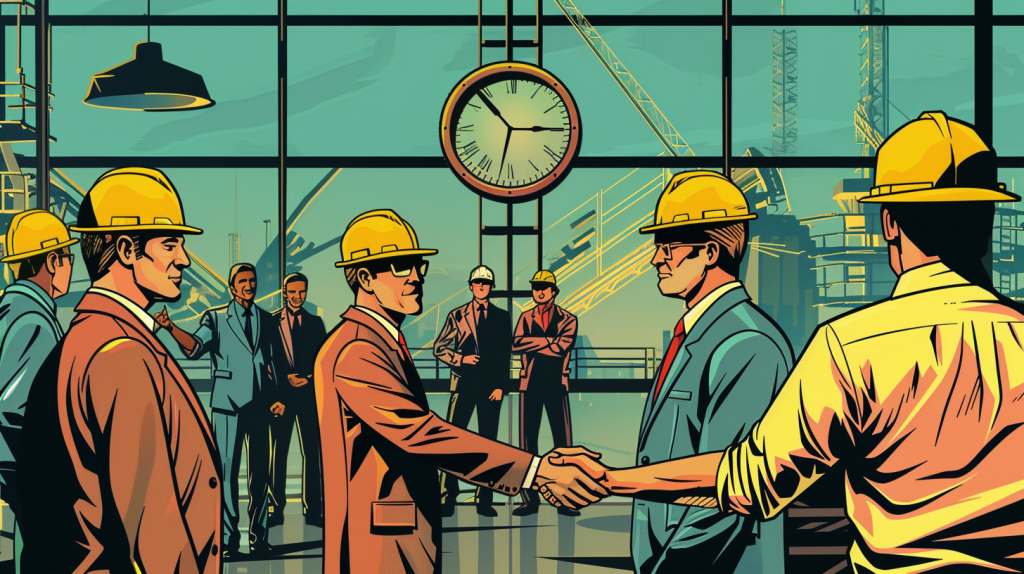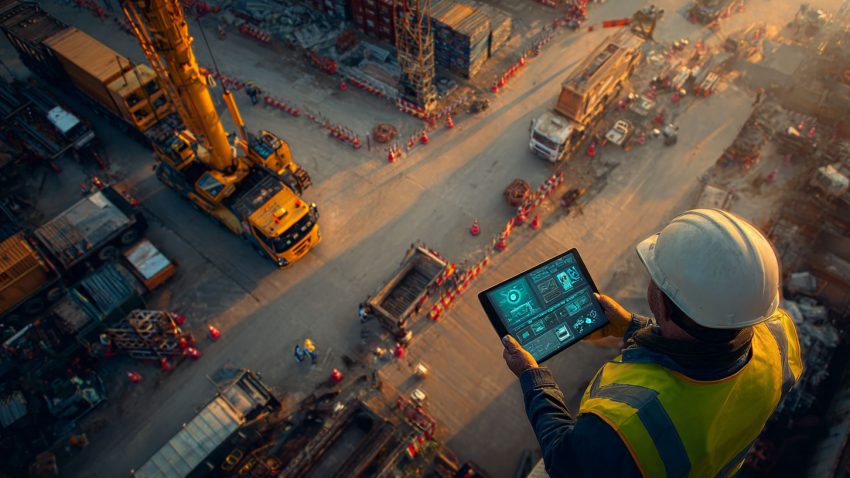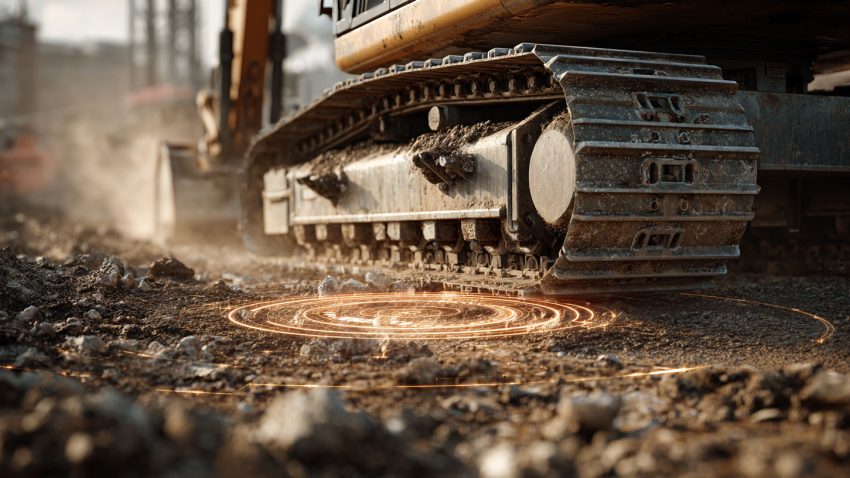Top 15 Ways AI Elevates Sustainable Construction via Project Management Software in Commercial Building
Table of Contents:
The Rise of AI in Commercial Construction
In recent years, the commercial construction industry has been undergoing a significant transformation, largely driven by the advent of Artificial Intelligence (AI). This technological revolution is not just a fleeting trend but a fundamental shift in how buildings are designed, constructed, and maintained. AI’s role in this sector is rapidly evolving from a novelty to a necessity, especially in the realm of sustainable construction.
Sustainability: A Core Objective in Construction
Sustainability in construction is no longer a choice but an imperative. As the world grapples with environmental challenges like climate change and resource depletion, the construction industry is under pressure to reduce its carbon footprint and embrace eco-friendly practices. This is where AI steps in, offering innovative solutions that not only support sustainability but also enhance efficiency and cost-effectiveness.

AI-Enabled Project Management: A Game-Changer
Project management software, when integrated with AI, becomes a powerful tool in the hands of architects, engineers, and builders. It transforms traditional construction practices, making them more aligned with sustainable goals. By leveraging AI, project management tools can handle complex data, automate tasks, and provide insights that were previously unattainable.
1. AI in Construction Project Optimization
The integration of AI in project management software significantly elevates the efficiency of construction projects. By analyzing historical data and current trends, AI can optimize project timelines, allocate resources more effectively, and anticipate potential challenges. This comprehensive approach ensures that projects are completed on time, within budget, and with minimal waste.
The Impact on Time Management
AI’s ability to predict and plan for various scenarios greatly improves time management in construction projects. It analyzes weather patterns, supply chain logistics, and workforce availability to create a more accurate and efficient project schedule. This not only saves time but also reduces the environmental impact caused by delays and extended construction periods.
Revolutionizing Resource Allocation
Resource allocation is made more efficient with AI. By predicting the exact amount of materials needed, AI minimizes waste and ensures that resources are used optimally. This is particularly crucial in sustainable construction, where the goal is to reduce the ecological footprint of building projects.
2. Enhancing Sustainable Building Practices with AI
AI plays a pivotal role in promoting sustainable building practices. From the design phase to construction and operation, AI-enabled project management software helps in creating buildings that are not only efficient but also environmentally friendly.
Designing for Sustainability
In the design phase, AI assists architects in creating models that are both aesthetically pleasing and sustainable. It analyzes various design options, considering factors like natural light, ventilation, and energy consumption, to propose designs that reduce the building’s environmental impact.
Implementing Eco-friendly Construction Methods
During construction, AI enables the use of eco-friendly methods and materials. It identifies the most sustainable construction practices and materials that can reduce carbon emissions and waste. This proactive approach helps in building structures that are in harmony with the environment.
3. AI in Energy Efficiency and Management
One of the key areas where AI contributes significantly to sustainable construction is energy management. AI algorithms are adept at predicting energy needs, optimizing usage, and integrating renewable energy sources into commercial buildings.
Predicting Energy Consumption Patterns
AI’s predictive capabilities allow for an accurate forecast of a building’s energy consumption. This helps in designing energy-efficient buildings that can significantly reduce electricity usage and costs.
Smart Integration of Renewable Energy
AI aids in the seamless integration of renewable energy sources like solar and wind into building designs. It analyzes the best possible ways to incorporate these sources, maximizing their efficiency and reducing reliance on non-renewable energy.
4. Waste Management and Reduction Through AI
Effective waste management is crucial in sustainable construction. AI-enabled project management software excels in identifying opportunities to reduce waste at each stage of the construction process.
Tracking and Managing Waste Production
AI systems can meticulously track waste production, promoting recycling and reuse wherever possible. This helps in significantly reducing the amount of waste generated during construction, making the process more sustainable.
Promoting Recycling and Reuse
AI algorithms identify materials that can be recycled or reused, reducing the need for new materials and minimizing the environmental impact. This approach not only supports sustainability but also leads to cost savings.
5. Predictive Maintenance for Long-term Sustainability
AI’s predictive maintenance capabilities are essential for the long-term sustainability of buildings. By forecasting potential issues before they occur, AI helps in maintaining buildings more efficiently, reducing the need for resource-intensive repairs and replacements.
Extending the Lifespan of Building Components
Predictive maintenance extends the lifespan of building components. AI analyzes data from various sensors and systems to predict when a component might fail, allowing for timely maintenance and replacements.
Reducing the Need for Repairs and Replacements
By accurately predicting maintenance needs, AI reduces the frequency and extent of repairs and replacements. This not only saves resources but also ensures that the building remains sustainable and efficient in the long run.
6. Optimizing Collaboration and Communication with AI
The role of AI in enhancing collaboration and communication among construction project teams is pivotal. AI-enabled project management software provides a platform for seamless interaction, ensuring that all stakeholders are on the same page regarding sustainable practices.
Streamlining Team Collaboration
AI tools facilitate real-time updates and information sharing among team members. This ensures that everyone involved in the construction project is aware of the sustainability goals and is working in tandem to achieve them.
Enhancing Decision-Making Processes
With AI, decision-making becomes more data-driven and accurate. The software can analyze complex datasets to provide insights that help teams make informed decisions about sustainable practices, materials, and designs.

StruxHub
Discover how StruxHub can revolutionize your construction management. Contact us today!
7. Real-time Monitoring for Sustainable Construction
AI’s ability to provide real-time monitoring is a game-changer in sustainable construction. This feature allows for immediate adjustments to be made, ensuring that sustainability goals are consistently met throughout the construction process.
Tracking Sustainability Metrics
AI tools can track a range of sustainability metrics, such as energy usage, waste production, and resource utilization. This real-time monitoring helps in quickly identifying areas where improvements are needed.
Ensuring Compliance with Sustainability Goals
By constantly monitoring these metrics, AI ensures that the construction project remains aligned with its sustainability goals. This real-time oversight is crucial for maintaining high standards of environmental responsibility.
8. Advanced Material Selection with AI
Choosing the right materials is crucial for sustainable construction, and AI plays a significant role in this process. It evaluates various factors to recommend materials that are environmentally friendly and suitable for each specific project.
Evaluating Environmental Impact
AI assesses the environmental impact of different materials, considering factors like carbon footprint, recyclability, and energy efficiency. This helps in selecting materials that align with sustainability objectives.
Fostering Durability and Energy Efficiency
AI prioritizes materials that are not only sustainable but also durable and energy-efficient. This leads to the construction of buildings that are sustainable in the long term and require less maintenance.
9. Labor Efficiency and Safety through AI
AI greatly contributes to enhancing labor efficiency and safety in construction sites. This not only boosts productivity but also plays a significant role in reducing the carbon footprint associated with labor-intensive processes.
Optimizing Labor Schedules
AI algorithms can optimize labor schedules, ensuring that work is carried out in the most efficient manner. This reduces the overall time and energy spent on the construction site, leading to a more sustainable process.
Enhancing On-site Safety
AI tools also play a crucial role in improving safety on construction sites. By analyzing data from various sources, AI can predict potential safety hazards and suggest measures to prevent accidents, ensuring a safer and more efficient working environment.
10. Compliance and Regulatory Adherence via AI
Navigating the complex landscape of environmental regulations is simplified with the aid of AI. It helps in ensuring that construction projects comply with sustainability standards, avoiding costly penalties and project delays.
Keeping Up with Environmental Regulations
AI systems are constantly updated with the latest environmental regulations and standards. This ensures that construction projects are always in compliance with the most current sustainability guidelines.
Avoiding Penalties and Delays
By ensuring compliance, AI helps in avoiding legal penalties and project delays that can arise from regulatory non-compliance. This not only saves time and money but also upholds the project’s commitment to sustainability.
11. Cost-effective Sustainable Solutions Enabled by AI
AI-driven project management tools are instrumental in identifying cost-saving opportunities that do not compromise sustainability. This makes green construction more accessible and appealing to a wider range of businesses.
Identifying Cost-saving Opportunities
AI analyzes various aspects of the construction process to identify areas where costs can be reduced without affecting sustainability. This includes optimizing resource use, reducing waste, and improving labor efficiency.
Making Green Construction Accessible
By providing cost-effective solutions, AI makes sustainable construction more accessible to businesses of all sizes. This democratization of green construction is essential for widespread adoption of sustainable practices in the industry.
12. Minimizing Carbon Footprint with AI
AI’s ability to optimize various construction processes directly contributes to reducing the overall carbon footprint of building projects. This is a crucial step towards achieving eco-friendly commercial construction.
Reducing Emissions in Construction Processes
AI tools help in identifying and implementing construction practices that minimize greenhouse gas emissions. This includes optimizing logistics, using sustainable materials, and reducing energy consumption on construction sites.
Promoting Eco-friendly Construction Practices
By promoting practices that are less harmful to the environment, AI is playing a key role in transforming the construction industry into a more sustainable sector. This not only benefits the environment but also enhances the industry’s public image.
13. Enhanced Quality Control for Sustainable Construction
Maintaining high standards of quality is essential for the sustainability of buildings. AI ensures that construction projects meet these standards, leading to structures that are durable and require fewer resources over time.
Ensuring High Standards of Construction Quality
AI tools analyze data from various construction processes to ensure that the highest standards of quality are maintained. This leads to the construction of buildings that are not only sustainable but also robust and long-lasting.
Reducing the Need for Future Renovations
By ensuring high quality, AI reduces the need for frequent renovations and rebuilds. This not only saves resources but also means that the buildings remain functional and sustainable for a longer period.
14. Smart Building Integration Post-Construction
After the construction phase, AI continues to play a crucial role by integrating smart building technologies. These technologies enhance the sustainability of commercial buildings through efficient operation and maintenance.
Implementing Smart Building Technologies
AI facilitates the integration of smart building technologies that monitor and manage building operations. This includes systems for energy management, waste reduction, and resource optimization.
Ensuring Efficient Operation and Maintenance
With AI, the operation and maintenance of buildings become more efficient and sustainable. These smart systems help in reducing energy consumption, managing waste effectively, and maintaining optimal environmental conditions.
15. Future-proofing Buildings with AI
AI helps in designing buildings that are adaptable and future-proof. These buildings are capable of incorporating new technologies and meeting evolving sustainability standards, ensuring their relevance and sustainability in the long term.
Designing for Future Challenges
AI tools assist in designing buildings that can adapt to future environmental challenges and technological advancements. This forward-thinking approach ensures that buildings remain sustainable and functional in the changing world.
Incorporating Evolving Sustainability Standards
As sustainability standards evolve, AI-equipped buildings are designed to meet these new criteria. This ensures that buildings are not only sustainable today but will continue to be so in the future.
AI’s integration into project management software has brought about a transformative change in the world of sustainable construction, especially in commercial buildings. From planning and design to operation and maintenance, the influence of AI is profound and far-reaching. Embracing these advancements is a step towards more efficient and sustainable construction practices. The role of AI in this transformation cannot be overstated, as it marks the dawn of a new, more responsible, and sustainable era in commercial construction.
StruxHub is a construction project management software that helps you manage projects from start to finish. It offers features like task management, document management, and communication tools. StruxHub can help you save time and money, improve communication, collaboration, and decision-making.
To learn more about how StruxHub can streamline your construction management processes, request a demo today. By completing our form, you’ll hear from our team soon to discuss how StruxHub can help you:
- Schedule construction material deliveries with your trades
- Coordinate construction site resources and on-site logistics
- Digitize work permits and inspection forms
- Communicate and track P6 and Excel schedules
- Broadcast announcements to all construction workers
Don’t miss out on the opportunity to optimize your construction management processes with StruxHub. Sign up for a free demo today.



